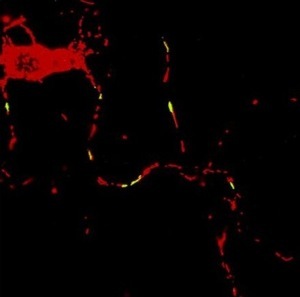
 Sarah B. Berman, M.D., Ph.D.
Sarah B. Berman, M.D., Ph.D.
Assistant Professor
Dr. Berman received her undergraduate degree in Human Biology from Stanford University. She received an M.D. from the University of Pittsburgh School of Medicine and a Ph.D. from the University of Pittsburgh Department of Neuroscience. She completed neurology residency and fellowship training at the Johns Hopkins University School of Medicine and was recruited to the University of Pittsburgh Department of Neurology and Pittsburgh Institute for Neurodegenerative Diseases in 2005. Dr. Berman is a diplomate of the American Board of Psychiatry and Neurology. She is also a member of the Board of Directors of the Parkinson Foundation of Western Pennsylvania, and sits on their Scientific Advisory Board.
Dr. Berman’s research focuses on the role of mitochondria in neurodegenerative diseases, particularly Parkinson’s disease, and her laboratory is evaluating the role of mitochondrial dynamics in neurodegenerative diseases. Mitochondria, the energy-producing organelles in cells, are very dynamic in neurons, undergoing frequent division (fission) and fusion, and being transported in a regulated fashion. These processes are critical for synapse function and formation, programmed cell death mechanisms, and protection of mitochondrial DNA. Changes in mitochondrial dynamics are increasingly being linked to neurodegenerative diseases. However, these mitochondrial processes have been very difficult to study directly, particularly in the brain. Using novel methodology, Dr. Berman’s laboratory directly studies the role of mitochondrial dynamics in neurotoxicity/neuroprotection in chronic Parkinson’s disease models, aging, and other neurodegenerative diseases, with the goals of elucidating important mitochondrial mechanisms in neurodegeneration and providing potential new therapeutic targets.
Dr. Berman’s research has been funded by the National Institute of Neurological Disorders and Stroke of the National Institutes of Health, the American Parkinson Disease Association, Pittsburgh Institute for Neurodegenerative Diseases, and the University of Pittsburgh Alzheimer’s Disease Research Center.
Recent Publications:
- Van Laar VS and Berman SB. Mitochondrial dynamics in Parkinson’s disease (2009) Exp. Neurol. In press.
- Berman SB, Chen Y, Qi, B, McCaffery JM, Rucker EB, Goebbels S, Nave K-A, Arnold BA, Jonas EA, Pineda FJ, and Hardwick JM (2009) Bcl-xL increases mitochondrial fission, fusion and biomass in neurons. J. Cell Biol. 184(5) 707-719.
- Berman SB, Pineda F, and Hardwick JM. (2008) Mitochondrial fission and fusion dynamics: the long and the short of it. Cell Death Differ.15(7), 1147-52.
- Cheng W., Berman SB, Ivanovska I, Jonas EA, Lee SJ, Chen Y, Kaczmarek LK, Pineda F, and Hardwick JM (2006) Mitochondrial factors with duals roles in death and survival. Oncogene. 25, 4697-4705.
- Berman SB and Greenamyre JT (2006) Update on Huntington’s disease. Curr Neurol Neurosci Rep. 6(4): 281-6.
- Berman SB, Watkins SC, and Hastings TG (2000) Quantitative biochemical and ultrastructural comparison of mitochondrial permeability transition in isolated brain and liver mitochondria: Evidence for reduced sensitivity of brain mitochondria. Exp. Neurol. 164 (2): 415-425.
- Berman SB and Hastings TG (1999) Dopamine oxidation alters mitochondrial respiration and induces permeability transition in brain mitochondria: Implications for Parkinson’s disease. J. Neurochem., 73, 1127-1137.
- Hastings TG and Berman SB (1999) Dopamine-induced toxicity and quinone modification of proteins. In The Role of Catechol Quinone Species in Cellular Toxicity. F.P. Graham Publishing.
Berman Lab Members:
Beth Arnold, M.S., Lab Manager
April Dukes, PhD, Research Associate
Victor VanLarr, Postdoctoral Fellow

